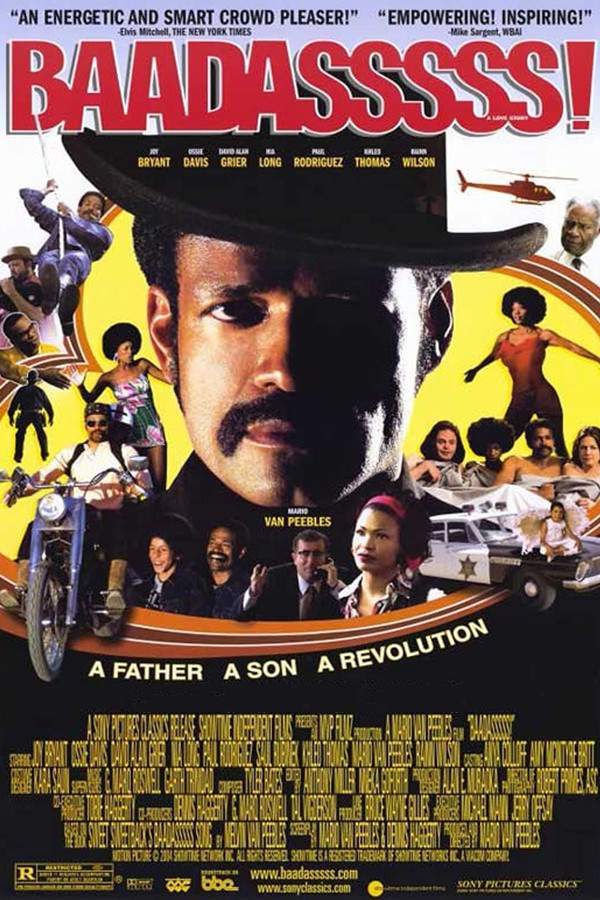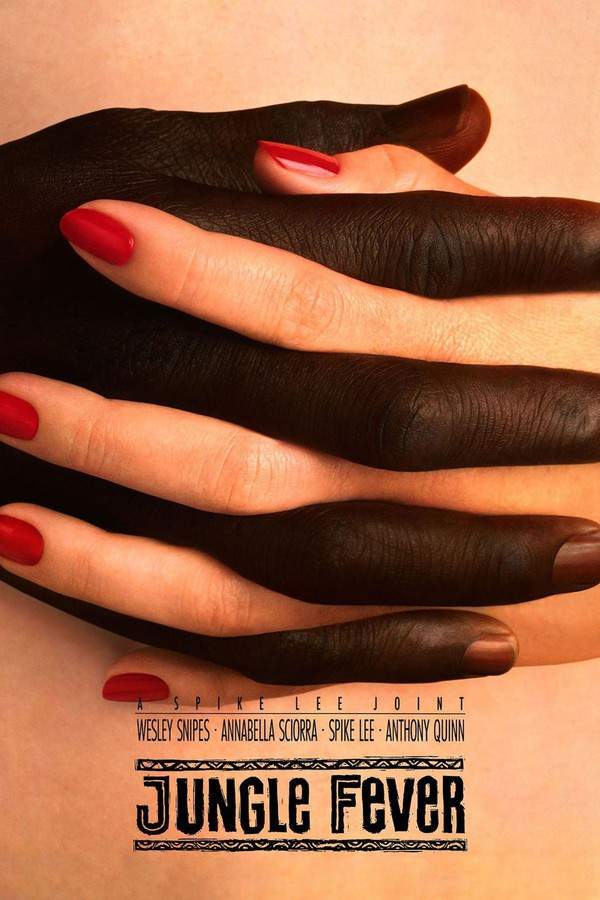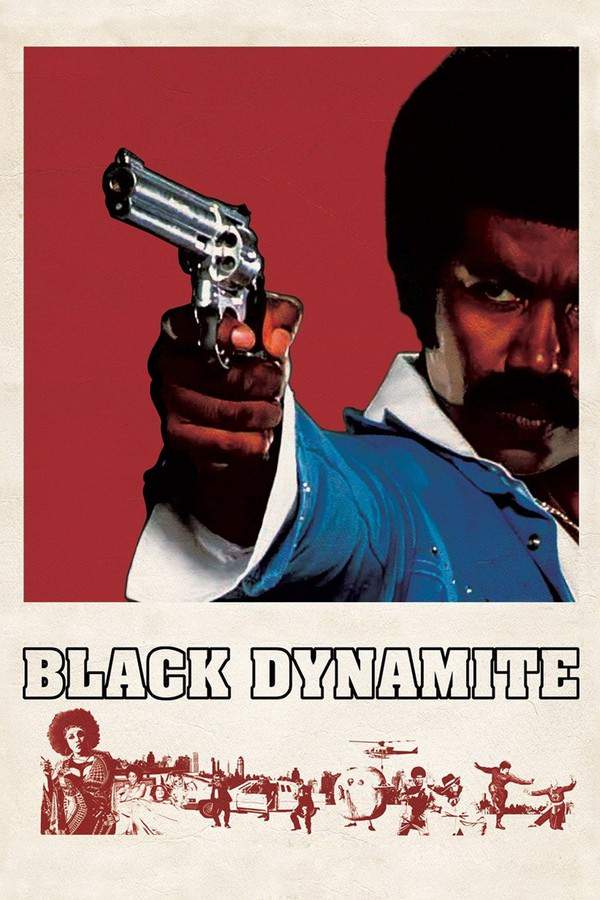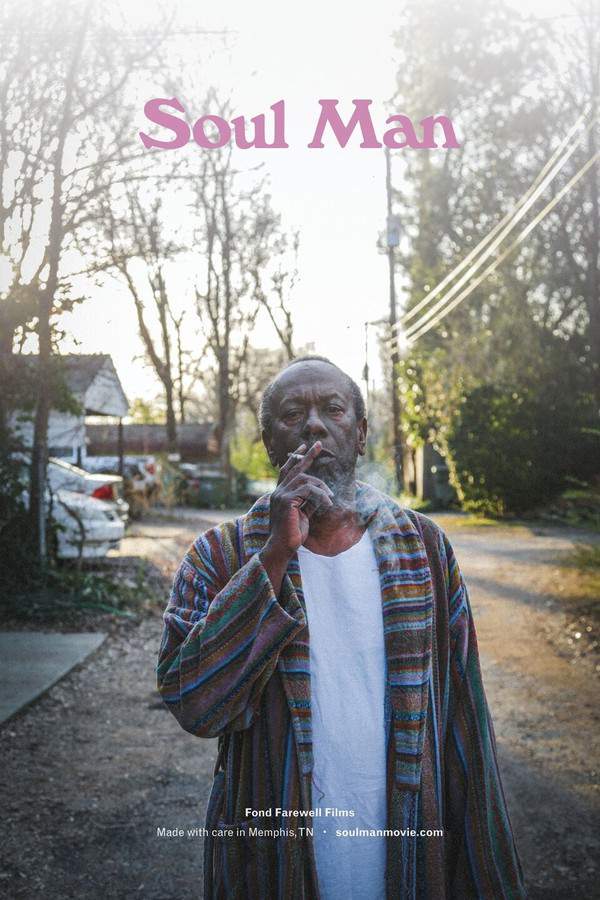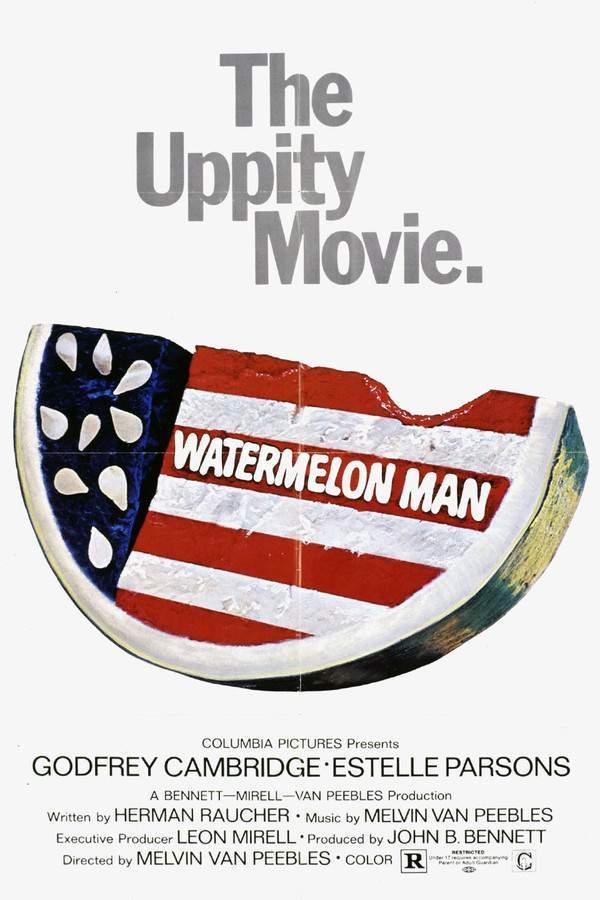
Test your knowledge of Watermelon Man with our quiz!
Watermelon Man Plot Summary
Read the complete plot summary and ending explained for Watermelon Man (1970). From turning points to emotional moments, uncover what really happened and why it matters.
Jeff Gerber, affectionately known as Jeff, leads a stereotypical suburban life with his apparently open-minded wife, Althea. His daily routine is marked by a peculiar combination of self-care practices, including sessions at a tanning machine, punching the speedbag, and downing health drinks, all culminating in a spirited run to work, almost as if he is endeavoring to escape the drudgery of his mundane existence. Despite putting on a cheerful face, many find Jeff’s personality grating, a characteristic that only seems to heighten Althea’s patience with her husband’s quirks.
As Althea tunes into the evening news, she becomes engrossed in the deepening racial tensions portrayed, gently admonishing Jeff for what she perceives as his lack of empathy. Unbeknownst to her, Jeff is about to embark on a surreal odyssey that will force him to reevaluate his very identity.
One pivotal morning, Jeff wakes up to a shocking transformation; his skin color has drastically changed. At first, he tries to dismiss it as a bizarre dream or a misfunctioning tanning machine. However, as the day progresses and his efforts to scrub away the newly acquired darkness prove unsuccessful, Jeff must confront the grim reality of his altered appearance.
Initially, Althea is taken aback, reacting with screams of disbelief as she sees “the Negro” standing in front of her. Throughout the day, Jeff retreats into isolation, terrified to face the outside world with his altered visage. In a desperate bid to revert to his original look, he ventures into the “colored part of town,” seeking out potions or elixirs that can restore his skin tone.
Come morning, Jeff’s dread transforms into a reluctant acceptance as he heads back to work. The day begins smoothly, but it isn’t long before he finds himself unjustly accused of robbery while sprinting alongside the bus, underscoring the harsh judgments often based solely on appearance. The treatment he receives from a police officer serves as a stark reminder of the systemic biases prevalent in society.
As Jeff navigates his new workplace dynamic, he encounters varying reactions—his boss’s suggestion to leverage his “Negro” charm contrasts starkly with an office secretary’s unexpected advances, as if his newfound appearance has suddenly enhanced his appeal. Amidst this chaos, Jeff starts to grasp the profound implications of his bizarre transformation—it serves as a wake-up call to the stark realities of racial discrimination and bias, challenging his previously held beliefs about himself and society.
As the sun sets, casting a warm glow across his domestic life, Jeff is unexpectedly drawn into a confrontation with the anonymous individuals behind the threatening phone calls he had previously received. It turns out that these seemingly unremarkable neighbors harbor ulterior motives; they aim to buy his property for a mere $50,000, motivated by their fears of declining property values. Determined to stand his ground, Jeff seizes the moment and elevates the negotiation to an impressive $100,000.
Simultaneously, the atmosphere within his household is shifting dramatically as Althea’s growing disenchantment with their life compels her to decide to send their children to live with her sister. As tensions flare, Althea ultimately opts to leave her husband, signaling a profound transformation in both Jeff’s personal and professional realms.
Throughout a series of poignant introspective moments, Jeff grapples with his identity, leading to a significant epiphany as he starts to accept the reality of being Black. This newfound self-awareness initiates a ripple effect of transformation in his life, prompting him to resign from his conventional job and venture into entrepreneurial opportunities, including the acquisition of an apartment building and the launch of his own insurance company.
As the narrative gracefully draws to a close, we find Jeff practicing martial arts alongside a group of everyday Black workers—a powerful testament to his personal growth, self-acceptance, and newly discovered sense of purpose.
Watermelon Man Timeline
Follow the complete movie timeline of Watermelon Man (1970) with every major event in chronological order. Great for understanding complex plots and story progression.
Jeff's Routine
Jeff Gerber leads a seemingly normal suburban life, filled with health routines that signify his attempts to escape the mundanity of his existence. This includes sessions at the tanning machine, vigorous workouts, and a spirited run to work, revealing his quirky personality that often irritates those around him.
Althea's Concern
As Althea watches the evening news, she becomes increasingly aware of the deepening racial tensions in society. She gently remarks on Jeff's lack of empathy, not knowing that their lives are about to take a drastically surreal turn.
The Transformation
In a shocking turn of events, Jeff wakes up one morning to find his skin color has dramatically changed. Initially dismissing it as a dream or a malfunction, he soon realizes that his new appearance is real and cannot be easily scrubbed away.
Althea's Reaction
When Althea sees Jeff in his altered form, she reacts with disbelief and fear, screaming at the sight of what she refers to as 'the Negro.' This moment marks the beginning of Jeff's isolation as he struggles to understand his new reality.
Jeff's Isolation
Faced with confusion and fear, Jeff isolates himself from the world, unwilling to confront the reactions of others. His desperation leads him to seek out solutions in the 'colored part of town' in hopes of reverting to his former self.
Accused of Robbery
Back at work, Jeff garners attention not just from colleagues but from the outside world, leading to an unjust accusation of robbery while running to catch a bus. This incident exposes him to societal biases that are deeply ingrained, changing his perspective on race.
Office Dynamics Shift
As Jeff adjusts to his new appearance, he encounters mixed reactions at work; his boss suggests he exploit his 'Negro charm,' while an office secretary unexpectedly shows interest in him. This juxtaposition illustrates the shifting dynamics of attraction and acceptance.
Confrontation with Neighbors
That evening, Jeff confronts the mysterious neighbors who have been making threatening phone calls. He discovers their ulterior motive of wanting to buy his property at a steal, which ignites a fierce negotiation where he insists on a much higher price.
Althea's Decision
In the midst of personal turmoil, Althea decides to send their children to live with her sister, fed up with their life together. This decision culminates in her leaving Jeff, marking a significant turning point in their marriage.
Jeff's Epiphany
After a period of self-reflection, Jeff undergoes a profound transformation, starting to accept his new identity as a Black man. This moment of clarity prompts him to reconsider his life choices and societal standing.
Resignation and New Ventures
With a newfound understanding of his identity, Jeff resigns from his conventional job. He embarks on entrepreneurial ventures, including acquiring an apartment building and starting his own insurance company, embracing his identity.
Personal Growth
As the story concludes, Jeff is seen practicing martial arts with a group of Black workers, symbolizing his acceptance and integration into a community. This scene underscores his significant personal growth and newfound sense of purpose.
Watermelon Man Characters
Explore all characters from Watermelon Man (1970). Get detailed profiles with their roles, arcs, and key relationships explained.
Jeff Gerber
Jeff Gerber is a typical suburban man whose life takes a dramatic turn following his unexpected transformation. Initially unaware of his privilege, he grapples with new prejudices and assumptions placed upon him due to his changed skin color. Throughout the film, Jeff evolves from ignorance to a deeper understanding of his identity and the societal issues surrounding race.
Althea Gerber
Althea, Jeff’s wife, initially appears to be open-minded but struggles with her husband’s transformation and what it means for their relationship. Her character represents the emotional toll of societal pressures and personal disappointments, ultimately leading her to seek a new path away from Jeff. Althea's growth reflects the complexities of marriage during turbulent times.
Watermelon Man Settings
Learn where and when Watermelon Man (1970) takes place. Explore the film’s settings, era, and how they shape the narrative.
Time period
The film is set in a contemporary era that captures the social issues of the time, particularly regarding race relations. It tackles the stereotypes and prejudice prevalent in society during that period, highlighting ongoing dialogues about identity and acceptance.
Location
Suburban Home, Colored Part of Town
The movie primarily takes place in a typical suburban neighborhood, symbolizing an idyllic yet superficial lifestyle. This setting contrasts sharply with the 'colored part of town', a location that represents the complexities and challenges of racial divisions. The dynamics between these places reflect the societal tensions that Jeff must navigate throughout his transformation.
Watermelon Man Themes
Discover the main themes in Watermelon Man (1970). Analyze the deeper meanings, emotional layers, and social commentary behind the film.
🌈
Identity
The theme of identity is central to the film as Jeff undergoes a surreal transformation that forces him to confront his racial identity. His journey reflects not only personal struggles but also societal expectations and prejudices. Through his experiences, the film explores the complexities of understanding oneself in a racially charged environment.
⚖️
Racial Discrimination
Racial discrimination is a prominent theme, as Jeff's transformation exposes him to the systemic biases that many individuals face. His experiences serve as a critique of society’s superficial judgments based on appearance, prompting a broader discussion about racism and the importance of empathy and understanding.
💔
Marriage Struggles
The film delves into the struggles within Jeff and Althea's marriage, showcasing how external societal pressures strain their relationship. Althea's growing dissatisfaction highlights the challenges of maintaining a partnership in the face of personal upheaval and changing dynamics, ultimately leading to a pivotal decision that affects their family.

Coming soon on iOS and Android
The Plot Explained Mobile App
From blockbusters to hidden gems — dive into movie stories anytime, anywhere. Save your favorites, discover plots faster, and never miss a twist again.
Sign up to be the first to know when we launch. Your email stays private — always.
Watermelon Man Spoiler-Free Summary
Discover the spoiler-free summary of Watermelon Man (1970). Get a concise overview without any spoilers.
In a breezy suburban landscape that feels both familiar and slightly exaggerated, Jeff Gerber lives a comfortably predictable life as an insurance salesman. His days are a ritual of early‑morning jogs, health‑drink routines, and a quirky devotion to a tanning machine that hints at a deeper yearning for control over his own image. Sharing his home is Althea, a wife whose outward openness masks a tension that bubbles beneath their seemingly stable marriage. The couple’s everyday banter and routine errands paint a picture of middle‑class America that is at once warm and subtly strained.
The tone of the film balances light‑hearted satire with an undercurrent of social observation, inviting the audience to laugh while also feeling the unease that comes from confronting unexamined assumptions. As the story unfolds, an implausible yet striking physical change thrusts Jeff into a reality he has never imagined: his skin color suddenly shifts, turning his familiar world on its head. This transformation becomes a narrative catalyst, turning ordinary interactions—workplace chatter, neighborly visits, and domestic conversations—into moments charged with new meaning.
Through Jeff’s bewildering experience, the movie explores how perception molds treatment, and how quickly the veneer of tolerance can crack when faced with the unfamiliar. The setting—a tidy suburb that mirrors the broader societal backdrop—serves as a microcosm for larger conversations about race, identity, and empathy. Along the way, Jeff’s relationship with Althea is tested, and his previously unremarkable existence begins to feel like a crucible for self‑examination.
As the film progresses, the audience is invited to question how much of who we are is defined by how others see us, and whether a sudden, unwanted shift in perspective can spark a deeper, more honest understanding of ourselves and the world around us.
Can’t find your movie? Request a summary here.
Movies with Similar Twists and Themes
Uncover films that echo the narrative beats, emotional arcs, or dramatic twists of the one you're exploring. These recommendations are handpicked based on story depth, thematic resonance, and spoiler-worthy moments — perfect for fans who crave more of the same intrigue.
Featured on this page

What's After the Movie?
Not sure whether to stay after the credits? Find out!
Explore Our Movie Platform
New Movie Releases (2026)
Famous Movie Actors
Top Film Production Studios
Movie Plot Summaries & Endings
Major Movie Awards & Winners
Best Concert Films & Music Documentaries
Movie Collections and Curated Lists
© 2026 What's After the Movie. All rights reserved.



